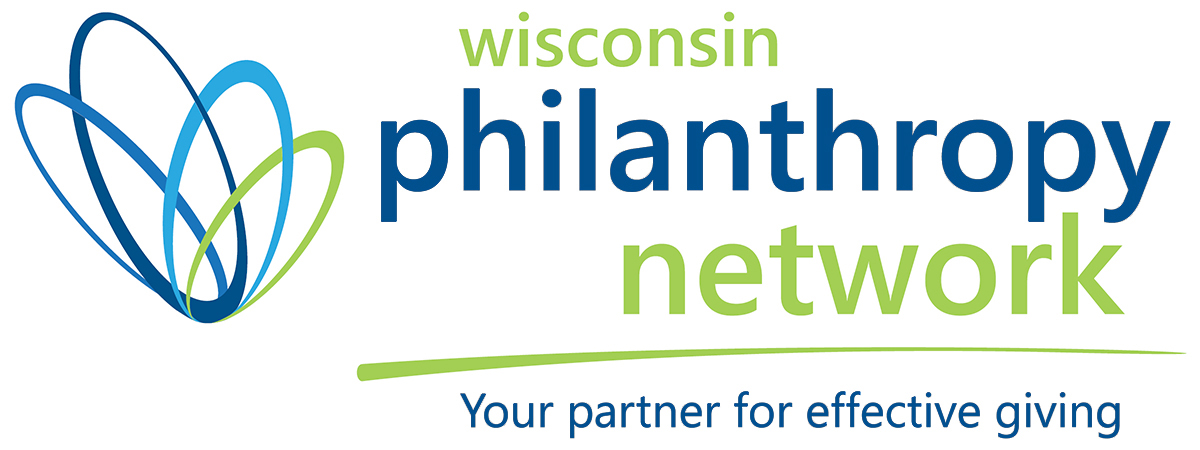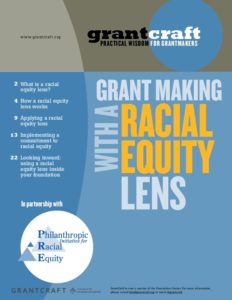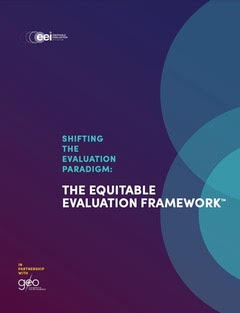
Shifting the Evaluation Paradigm: The Equitable Evaluation Framework
GEO Funders
This publication provides an overview of the impetus for the Equitable Evaluation Framework™ (EEF) and attempts to document early moments and first steps of engagement with U.S. philanthropic institutions — most often their research, evaluation and learning staff — whom we refer to as foundation partners throughout this publication.
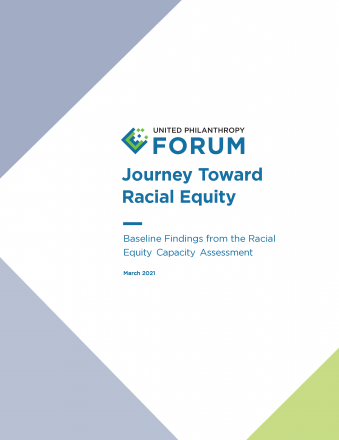
Journey Toward Racial Equity Report
United Philanthropy Forum
The Racial Equity Capacity Assessment and this report were realized through the contribution and efforts of many individuals. The Forum is grateful to be on this journey with all of the individuals who made this effort possible and deeply appreciates their thought partnership and commitment to advancing racial equity.

Using Data to Make the Case for Equity
PEAK Grantmaking
This message reminds us that challenges in one aspect of life can result in challenges in all aspects of life, and health is no exception. This message also reminds us to listen to people, to hear what challenges they are experiencing, and to truly understand the conditions affecting not just their health, but their lives.
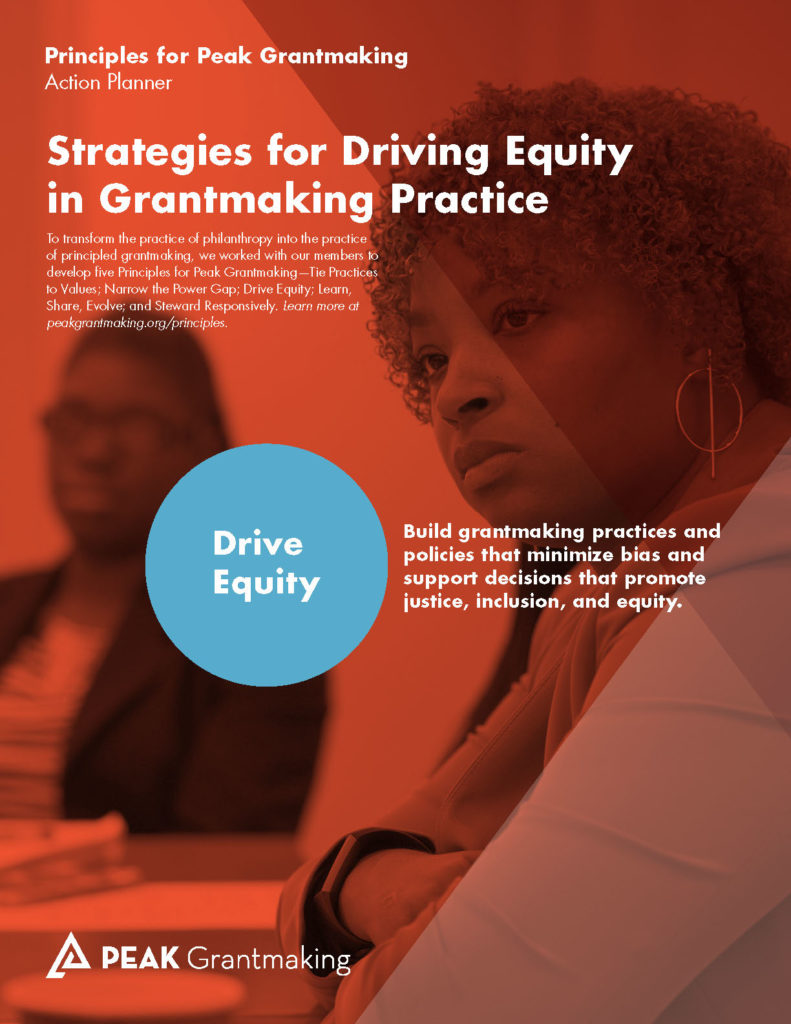
Strategies for Driving Equity in Grantmaking
PEAK Grantmaking
If your organization is looking to improve outcomes for communities and organizations that are often sidelined by the traditional grantmaking process, explore how you can reduce bias and how you can get started with collecting and tracking the demographic data that can inform impact.
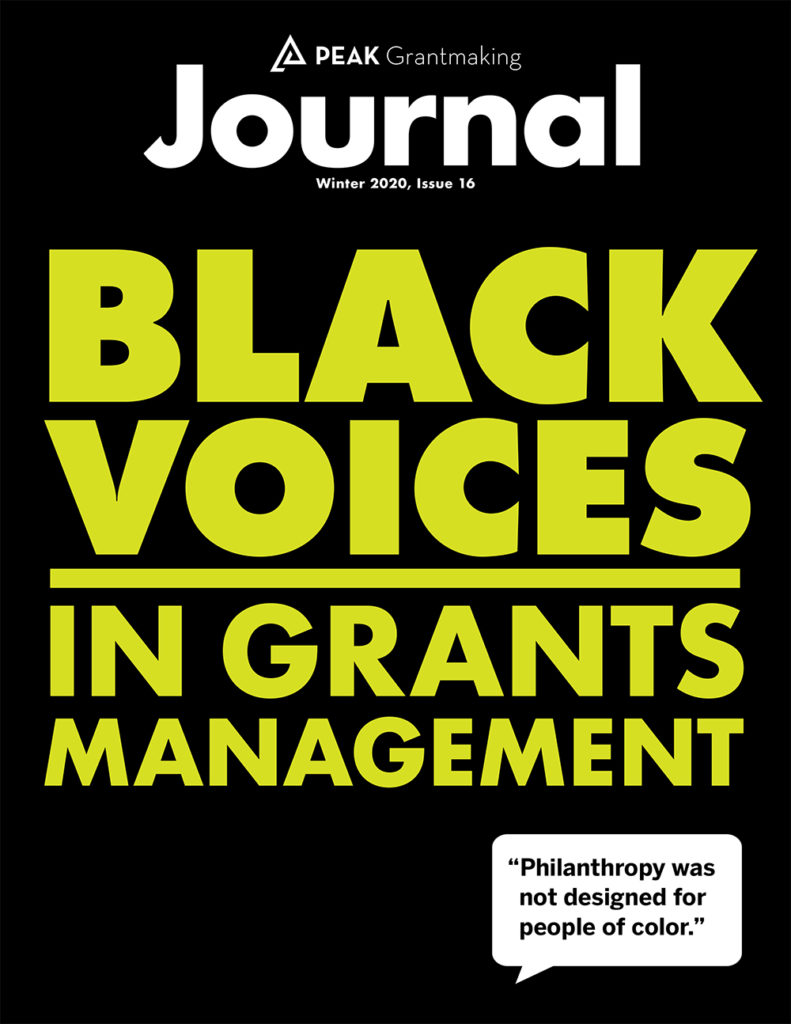
Black Voices in Grants Management
PEAK Grantmaking
In this issue, a range of contributors are giving voice to the experience of Black grants management professionals, highlighting their work and ideas for building inclusive cultures, equitable grantmaking practices, allyship, and more.
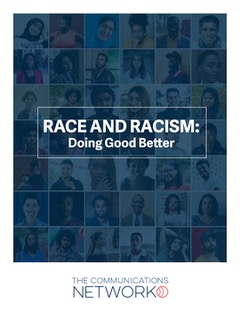
Race and Racism: Doing Good Better
The Communications Network
When The Communications Network set out in 2019 to assess what expert
practitioners and academics could tell us about applying equity-driven best
practices to foundation and nonprofit communications, we did not find the perfect
guide. What we did find were illuminating insights and helpful feedback from
practitioners in the field that, together, offer us a sense of where we can begin to
do better.
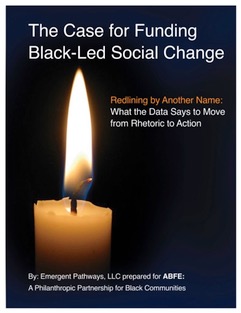
The Case for Funding Black-Led Social Change
ABFE
ABFE: A Philanthropic Partnership for Black Communities (ABFE), recently conducted a study to learn how leaders of Black-led social change organizations in the United States and U.S. Territories describe their interactions with institutional philanthropy. The research had two purposes. The first was to build a body of information on the health and well-being of existing Black social change infrastructure in this country. The second was to use this information to inform the future actions of the Black Social Change Funders Network (BSCFN), as well as to encourage philanthropic staff, consultants and trustees to change the ways they think and act with Black-led organizations (BLOs) and Black communities.

Guiding a Giving Response to Anti-Black Injustice
The Bridgespan Group
This memo offers funders potential paths to invest in organizations and movements within the Black-led racial justice ecosystem. It provides principles for giving and highlights priority investment areas and example organizations within those areas.

Too Many Local Community Foundations Still Underinvesting in Black Communities
National Committee for Responsive Philanthropy
We started by looking at the latest available grantmaking data (2016-2018) of 25 community foundations (CFs) – from Los Angeles to New Orleans to New York City to St. Paul. These foundations represent a cross section of some of the country’s largest community foundations as well as foundations in communities where NCRP has Black-led nonprofit allies.

The Bridgespan Group and Echoing Green
Echoing Green and Bridgespan recently teamed up to research the depth of racial inequities in philanthropic funding. As intermediaries in the sector, we work with organizations that are often at distinctly different points in their development, which gives us a broad combined view of the sector. Echoing Green is devoted to supporting emerging leaders and their early-stage organizations and provides seed funding and leadership development through its annual fellowship program. Bridgespan is a global nonprofit that advises organizations and philanthropists, including extensive work helping philanthropists make
large commitments (“big bets”).

Diversity Reporting Under the Spotlight
The Conference Board
Publishing diversity metrics (such as the age and gender composition of employees) is an established feature of corporate sustainability reporting—where companies disclose their environmental, social, and economic practices, including related policies, targets, and impacts. Our view is that the current level of diversity and inclusion (D&I) disclosure in Europe lacks both sufficient breadth and depth to satisfy the diverse needs of external stakeholders and to address societal concerns about equality, equity and social inclusion. It is likely that stakeholders' (e.g., investors and national governments) interest in D&I reporting will continue to increase, and it will be an increasingly important responsibility for D&I executives to manage both the risks and opportunities this brings.
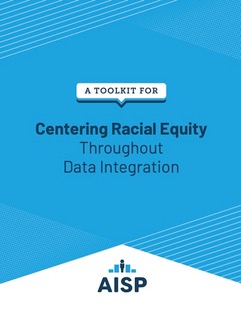
A Toolkit for Centering Racial Equity Throughout Data Integration
AISP
This body of work seeks to encourage shifts of awareness and practice, by centering racial equity and community voice within the context of data integration and use. Our vision is one of ethical data use with a racial equity lens, that supports power sharing and building across agencies and community members.
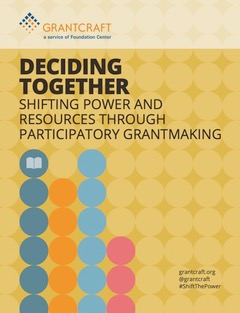
Deciding Together: Shifting Power and Resources Through Participatory Grantmaking
Grantcraft
In Deciding Together: Shifting Power and Resources Through Participatory Grantmaking, we look at why and how funders are engaging in participatory
grantmaking and shifting decision making power to the very communities impacted by funding decisions. Through examples and insights from a diverse range of participatory grantmakers, we explore the benefits, challenges, and models of participatory grantmaking.
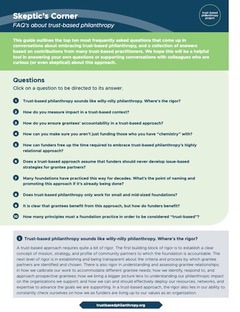
Skeptic's Corner: FAQ's about trust-based philanthropy
Trust-based Philanthropy: An approach
Trust-based Philanthropy Project
This guide outlines the top ten most frequently asked questions that come up in conversations about embracing trust-based philanthropy, and a collection of answers based on contributions from many trust-based practitioners. We hope this will be a helpful tool in answering your own questions or supporting conversations with colleagues who are curious (or even skeptical) about this approach.

Building Movement Project
Race to Lead Revisited: Obstacles and Opportunities in Addressing the Nonprofit Racial Leadership Gap presents findings from a 2019 survey of more than 5,000 paid nonprofit staff on their experiences of race and leadership
in nonprofit settings, including many of the same questions asked in the original survey. New data and analysis Introduction race to lead revisited: obstacles and opportunities in addressing the nonprofit racial leadership gap explores how respondents experience diversity, equity, and inclusion (DEI) efforts in the workplace, personal and organizational financial circumstances, and views on how to both increase the diversity of nonprofit leaders and better support people of color already leading in the sector.
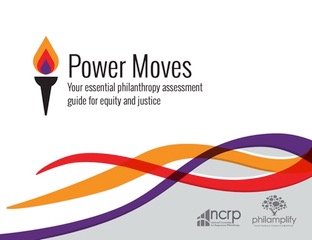
Power Moves: Your essential philanthropy assessment guide for equity and justice
National Committee for Responsive Philanthropy
Power Moves is designed for foundations that want to exercise the power they have to make change. It is intended for any grantmaker – or advisor to a grantmaker – who cares about marginalized communities and wants to more effectively advance justice and equity. It will benefit funders who value community engagement and want deeper partnerships, along with those who value community-centered solutions and want greater impact. Wherever you are
on your philanthropic leadership journey, this toolkit can help you take stock and identify new insights – particularly if you engage with the material with an open mind and curiosity.

Nonprofit Diversity Efforts: Current Practices and the Role of Foundations
Center for Effective Philanthropy
The Center for Effective Philanthropy has sought to understand the efforts of
nonprofit organizations when it comes to diversity and the ways in which their
foundation funders are interacting with and/or supporting those efforts. In what
ways is diversity relevant to nonprofit organizations’ goals? What demographic information are nonprofits collecting, and how is that information used? How are foundations involved in the diversity efforts of grantees, and how would those grantees like their funders to be involved? To answer these questions, we sent surveys to 338 leaders of nonprofit organizations with annual expenses between $100,000 and $100 million. We received responses from 205 of those leaders for a response rate of 61 percent. It is our hope that the data presented in this report will be useful to foundation leaders as they consider this important topic.

The State of Change: An Analysis of Women and People of Color in the Philanthropic Sector
Council on Foundations
This report raises a number of important questions about why there hasn’t been more change in the diversity of our institutions in recent years, despite the steps taken to create a more diverse and inclusive philanthropic sector. The report also includes a discussion guide designed to facilitate dialogues between foundation leaders, their board members and their staff.
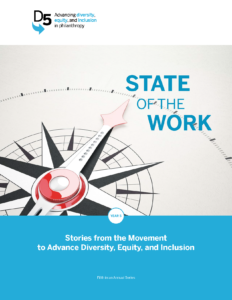
State of the Work: Stories from the Movement to Advance Diversity, Equity, and Inclusion (2016)
D5 Coalition
The State of the Work provides an opportunity to share many of the lessons we are learning from this rising interest in strengthening the common good by advancing diversity, equity, and inclusion. In this issue, D5 asked three scholars/practitioners to provide perspectives and analysis on these issues and to present a charge to their peers in philanthropy. D5 hopes that their perspectives will push the field to go deeper, to engage in dialogue and debate, and to keep at it. As D5 enters the home stretch of their five-year effort to advance philanthropy’s diversity, equity, and inclusion, D5 is focused on motivating leaders in philanthropy—like you—to take action in support of this cause.

Diverse Managers: Philanthropy’s Next Hurdle
Council on Foundations
This white paper outlines best practices with proven results that foundations can use to find and create a diverse and inclusive staff and investment advisory team. Readers will learn how to make the business case for more diverse and equitable strategies and link success in this area with investment results. Readers will also learn about the Association of Black Foundation Executives’ Investment Manager Diversity Pledge that foundations and endowments can undertake to ensure that their organizations adopt inclusive practices encouraging managers of diverse ethnicity and gender to compete for positions in endowment management.In recent years, philanthropic organizations have made concerted efforts to diversify their leadership, culture, and staff, seeking to become more inclusive and representative. Diversity initiatives have flourished in philanthropic institutions as a result. Today the public is no longer surprised when our nation’s largest grantmaking foundations and corporations appoint African American, Latino, and women leaders as chief executive officers, chief investment officers, and chief operating officers.

D5: Final State of the Work - Stories from the Movement to Advance Diversity, Equity, and Inclusion
D5 Coalition
These stories capture an essential dimension of this work—the human impact. Unlike logic models or collective impact strategies, issues of diversity and inclusion, privilege and identity, resources and equity touch us as human beings—not just as activists or planners, CEOs or strategists. These stories can inform strategy, but more importantly they instill hope, inspire courage, and buttress our shared commitment to advance the common good.
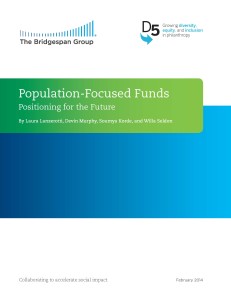
Population Focused Funds: Positioning for the Future (2014)
D5 Coalition and The Bridgespan Group
To be sure, for many years these funds were best positioned to attract resources to and from their communities. Population-focused funds, unlike most mainstream philanthropy, more fully resemble and represent their communities. As such, they often have the relationships and cultural competence that can make them a trusted resource. But population-focused funds are a diverse set of organizations, and they’ve learned that we need to be careful about overgeneralizing. Moreover, these funds confront rapidly changing environments that require them to think hard about their roles in their communities and their business models. And while, as this report indicates, these funds clearly continue to play important roles, they must have a much more rigorous focus on impact to demonstrate their strategic added value.
The examples in this report highlight what is possible when population focused funds find a unique and valued niche within their communities. These are stories of adaptation in shifting contexts, while maintaining a focus on strengthening communities. Their hope is that the data and examples in this report will help population focused funds see multiple pathways toward greater sustainability and impact. For funders, both individuals and institutions, they also hope this report answers many of your questions about how and why population-focused funds can be highly effective in addressing community needs.
Critical Issues Forum Volume No. 5 Moving Forward on Racial Justice Philanthropy
Philanthropic Initiative for Racial Equity
As with each volume of PRE’s Critical Issues Forum, we offer these articles with the hope of sparking deeper discourse and greater learning in the field. Even more so than in the past, we hope that publishing the volume online creates a shared space for others to
weigh in. We invite you to join in the dialogue as we reflect and continue building on the work of so many before us, and create new bridges for the many who are taking up this work now and after us.
Changing the Rules of the Game: Youth Development and Structural Racism
Philanthropic Initiative for Racial Equity
With support of the Ford Foundation, the
Philanthropic Initiative for Racial Equity (PRE) and mosaic consulting embarked on an 18-month study into the ways select community organizations engage youth in confronting structural racism.
Cultivating Interdependence: A Guide for Race Relations and Racial Justice Organizations
Joint Center for Political and Economic Studies
Cultivating Interdependence: A Guide for Race Relations and Racial Justice Organizations reports on our community-level efforts in four localities. It articulates three key premises: that every approach, implemented with high quality, has a role; that effectively confronting persistent racism requires a multi-level and multi-approach plan; and that working together
as a learning community challenges us to rethink many of our current assumptions and methods of operation.
Grantmaking with a Racial Equity Lens
GrantCraft
In this guide, grantmakers explain why a focus on racial equity gives them a powerful "lens" for understanding and advancing their work. Drawing on firsthand experiences, the guide offers advise on promoting and deepening your foundation's commitment to racial equity, both internally and in the programs you support.
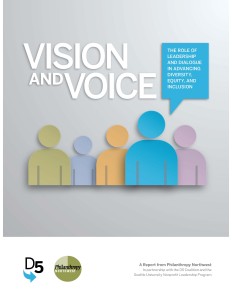
Vision and Voice: The Role of Leadership and Dialogue in Advancing Diversity, Equity, and Inclusion
D5 and Philanthropy Northwest
Despite a field replete with research, analysis, recommended policies and practices—not to mention an abundance of educational programs and frameworks for grantmaking to diverse communities—philanthropic leaders have been slow to advance these values in their foundations. They wondered: what is getting in the way? Why are good intentions, buttressed with theory and practical advice, not achieving better results on measures of diversity, equity, and inclusion? With the support of the D5 Coalition, Philanthropy Northwest began a year-long study to explore these questions.

Grantmaking with a Racial Justice Lens
Philanthropic Initiative for Racial Equity
The new Grantmaking with a Racial Justice Lens: A Practical Guide, written by PRE Senior Fellow Rinku Sen and Executive Director Lori Villarosa with contributions from Maggie Potapchuk, Lisa McGill, and Makani Themba, provides grantmakers with reflections, frameworks and tools built from the direct experience of activists and funders for advancing racial justice in any philanthropic setting.
